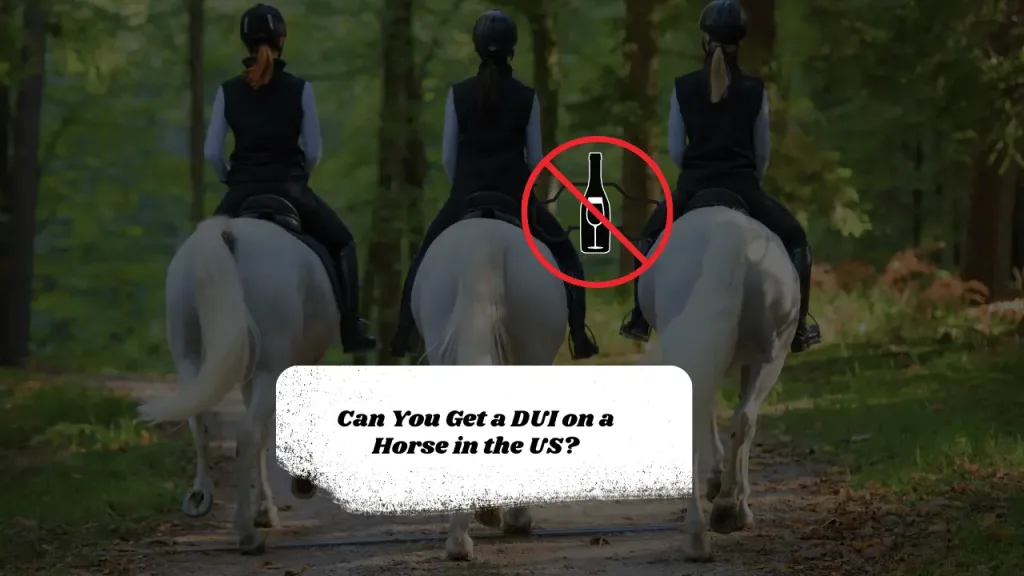Can You Get a DUI on a Horse in the US?
Riding a horse while under the influence might sound like a quirky scenario, but it can lead to real legal trouble in the United States. With over 1 million DUI arrests annually in the US, law enforcement takes impaired operation of any vehicle—even a horse—seriously. The question remains: can a horse truly count as a “vehicle” under DUI laws? Here’s what you need to know.
Table of Contents
What Determines a DUI on a Horse?
- State DUI Laws: DUI statutes vary widely across the US, but many states define a “vehicle” broadly. Some include non-motorized means of transportation, which may cover horseback riding.
- Broad Definition: In states like Kentucky and Colorado, horses have been considered vehicles under DUI laws.
- Motor Vehicle Focus: States such as California explicitly restrict DUI laws to motorized vehicles, meaning a horse does not qualify.
- Public Intoxication Laws: Even in states where a horse does not meet the definition of a vehicle, riding a horse while intoxicated can still lead to charges such as public intoxication, reckless endangerment, or animal cruelty.
- Safety Risks: Riding a horse while impaired poses risks not only to the rider but also to the public and the horse itself. Many charges arise from the dangers caused by intoxicated riding on public roads or crowded areas.
Real-Life Cases of DUI on a Horse
- Kentucky: A man was arrested and charged with DUI while riding his horse on a public road. The state’s laws consider a horse a vehicle, leading to the charge.
- Colorado: Similar charges were filed against a rider under DUI laws that apply to all modes of transport, including animals.
- California: A horseback rider was not charged with a DUI but faced public intoxication charges, as the state’s laws only apply to motorized vehicles.
Factors Influencing Charges
- Location: Riding on public roads or highways increases the likelihood of being charged, as it creates a safety hazard.
- Behavior: Erratic or dangerous behavior while on horseback can attract law enforcement attention.
- State-Specific Laws: Whether a horse qualifies as a vehicle depends entirely on the state’s legal definitions.
Related Articles For You:
Can You Get a DUI on a Horse in Florida?
Can You Get a DUI on a Horse and Buggy in the US?

Penalties for DUI on a Horse
Penalties vary by state and the specific charge, but they can include:
- Fines and court fees
- Jail time (for repeat offenders or severe cases)
- Loss of driving privileges (if tied to DUI laws)
- Additional charges like animal cruelty or reckless endangerment
Preventative Tips
- Stick to Private Property: Riding a horse while intoxicated is less likely to lead to legal trouble if you stay off public roads.
- Understand Local Laws: Research your state’s DUI and public intoxication statutes to avoid unintended violations.
- Avoid Intoxicated Riding: The safest option is not to ride while impaired, ensuring your safety and that of others.
FAQs About DUI on a Horse
Can you get a DUI on private property while riding a horse?
In most cases, DUI laws only apply to public roads or areas. However, public intoxication laws may still apply on private property if there’s a risk to others.
Are horses considered vehicles in every state?
No, the classification of a horse as a vehicle depends on state-specific laws. For example, Kentucky considers horses vehicles, while California does not.
Can riding a horse while intoxicated lead to animal cruelty charges?
Yes, if your actions endanger the horse’s safety, you could face additional charges related to animal welfare.
How common are DUI charges on horses?
While relatively rare, cases have been reported in states like Kentucky and Colorado where laws explicitly or broadly define vehicles.
Can you lose your driver’s license for a DUI on a horse?
In states where DUI laws apply to horseback riding, penalties such as license suspension can occur if tied to motor vehicle statutes.
Statistics to Consider
- Over 1 million DUI arrests are made annually in the US, highlighting the strict enforcement of impaired operation laws.
- States with broader DUI laws, like Kentucky, have reported isolated cases of horseback DUIs, showing that these laws are not just theoretical.
- Public intoxication and reckless endangerment charges are more commonly applied to horseback riders in states that exclude horses from DUI statutes.
Conclusion
While the ability to get a DUI on a horse depends on the specific laws of the state, riding a horse under the influence can still lead to serious legal consequences. Familiarize yourself with your state’s regulations and prioritize safety to avoid complications. If in doubt, it’s best to stay sober while enjoying a ride.
About the Author

Sarah Klein, JD, is a former criminal defense attorney with hands-on experience in cases involving DUIs, petty theft, assault, and false accusations. Through All About Lawyer, she now helps readers understand their legal rights, the criminal justice process, and how to protect themselves when facing charges.
Read more about Sarah
